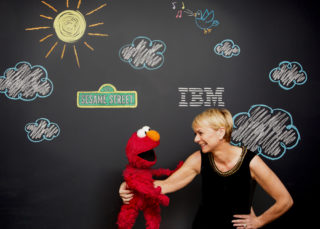Whether it’s supermodel Karolina Kurkova wearing a smart dress at the Met Gala, or Wimbledon fans being scanned by a supercomputer at the All England Club, or teaming up with Sesame Street to advance early childhood education, IBM Watson has had no shortage of innovative activations to announce this year to leverage its cognitive business platform.
How are brands using data to understand consumers and to better communicate with them on a personal level?
Stephen Gold, the chief marketing officer for IBM Watson Group and vice president for partner programs and venture capital at IBM, joined [a]listdaily to discuss the company’s approach to their data deluge.

Take us through the strategy a bit when forming an alliance. What are you specifically looking for to deem that it’s the right fit?
The activations are instrumental in helping us engage and educate a market on a new era of computing. With Watson, we look to reach a wide array of industries and professions on use for case-specific challenges. In the case of Macy’s, Watson is helping the retailer improve the customer shopping experience. This pilot effort stems from Macy’s desire to provide better ‘wayfinding’ assistance to their customers—a significant issue, as most of their stores have unique layouts—and a willingness to embrace new technologies as an avenue to deliver that functionality.
In a very different context, the Met Gala project was a demonstration of how Watson can be used to amplify human creativity. By applying various cognitive capabilities from Watson, like Color Theory and Tone Analyzer, IBM helped bring man and machine together to create an exceptional fashion design. We’re continually applying the dozens of Watson core cognitive services to meaningful societal and business challenges, focusing on building out applications that will help individuals, industries and organizations transform the way they operate.
In which particular sectors—from major to minor—are you looking to form strategic alliances in? What works well with Watson?
Watson’s cognitive capabilities lend themselves to situations that are data rich, but information poor. This spans everything from health to retail, financial services to the public sector and mining to telecommunications. There isn’t a single industry that won’t be transformed by this technology. Currently, tens of thousands of developers, and hundreds of clients and partners, representing over 20 industries across six continents, actively use Watson. Today you can find Watson at work in Thailand, where over 1.1 million patients at Bumrungrad Hospital can benefit from Watson for Oncology; in Singapore, where more than 5 million citizens get tax advice with an app powered by Watson; and in Australia, where and over 40,000 students get campus and administrative guidance through a Watson application, just to name a few.

How do you see market expansion and partnerships developing for Watson in the future? What are you putting a particular emphasis on?
IBM is committed to maintaining an open platform environment to encourage use and adoption of its Watson API services by students, hobbyists, developers, independent software vendors and the community at large. This will continue to spark innovation and the next generation applications that will tackle some of life’s toughest challenges. IBM’s continued investment in research and development, approaching $6 billion annually, and head start in the area of artificial in intelligence has allowed us to bring Watson to a point where it’s easier to teach, use and connect to existing technologies, systems and data sets, as well as easier for developers to build Watson into their applications. Over the past two years, IBM has taught Watson many new languages; increased its core knowledge of key industry domains; made it available via new form factors—tablets, smartphones, robotics and smart watches like Apple Watch—and enhanced it with technology that allows it to ‘see,’ as well as understand tone and emotion. We believe that in the future, every critical decision will be informed by a cognitive system like Watson.
Over the past two years, IBM has taught Watson many new languages; increased its core knowledge of key industry domains; made it available via new form factors—tablets, smartphones, robotics and smart watches like Apple Watch—and enhanced it with technology that allows it to ‘see,’ as well as understand tone and emotion. We believe that in the future, every critical decision will be informed by a cognitive system like Watson.
How has Watson’s data-crunching systems been received by marketers? Why is employing Watson’s A.I. tech a big boon for brands?
Marketers have long sought to better understand their customers, clients, patients, partners and citizens, and gain the ability to communicate with them on a very personalized level. Much of the data explosion that has occurred, especially in the social realm, has provided an incredible wealth of information for marketers to learn from and respond to. But to take advantage of this newfound resource, they need cognitive capabilities. This will change the way they communicate, target, promote, and respond to their audience. Watson-based solutions today exist to help marketers personalize their message by understating in real-time an individual’s personality, sentiment and tone. They can also extract concepts from blogs, articles and tweets to stay on top of the latest trends and chatter.

How are companies looking to develop tailored marketing campaigns and products? What are they looking forward to learning most?
Marketers pay a steep price for not understanding their customers’ needs and reactions to their business decisions. Watson can help marketers better understand their customers on an individual level, creating a more personalized experience that can lead to deeper engagement and stronger brand affinity. The marketing industry is awash in unstructured data, from tweets to Facebook posts to photo-sharing apps like Instagram. Locked away in that data are tremendous insights into what we as individuals are looking to do, how we expect to be treated and what we want our interactions to be like. Cognitive systems like Watson can help marketers unlock that data to for a better, more complete understanding of their audience, and the best way to connect with them.
Watson recently moved into a retail store setting by partnering with specific Macy’s locations to improve the in-store experience of locating products, facilities and service. How will you be marketing this new initiative, and measuring the success of it?
Macy’s On Call is an example of how retailers can use cognitive systems to make the shopping experience more impactful. In the case of Macy’s, this means helping consumers locate products, facilities and services. The Macy’s effort is a pilot that taps into an intelligent engagement platform built by Satisfi, one of our Watson developer partners. They’ve incorporated Watson technology to boost the functionality of their app and deliver on the specific experience Macy’s was seeking—including applying Watson’s language abilities to converse with Spanish-speaking customers in their native language. This is another example of how our developer partners are amplifying the reach of Watson in the market and helping the technology reach new consumer audiences.

What is the biggest challenge in marketing the world’s first cognitive computing system? On the flip side, what are the exciting opportunities it presents?
Helping individuals understand this new era of computing where systems understand content in context, reason with a purpose, learn at scale and interact naturally with humans is the most pressing challenge. For over 60 years, what we have known about computing has been based on rules—hard-coded logic—against information that was neatly organized into rows and columns. With cognitive computing, we’re redefining the possibilities of how humans will use information of all types to enhance, scale and accelerate their own expertise. Today, we’re focused on scaling the technology across multiple domains and making it proficient in multiple languages. We continue to make Watson easier to use, teach and deploy. This is the first five years of what will likely be a 50-year history of this new form of computing, and the horizons for cognitive computing—and the ways we can market it—are endless.
Earlier this year, Kia used IBM Watson to help set their lineup of social media influencers for the Super Bowl. What’s your view of Watson’s commercial approach to the influencer marketplace?
Watson’s cognitive services enable marketers to make sense of this data, and turn it into meaningful insights that can help advance client-business objectives. For example, in the Kia project, it’s another great example of our partners in action. Developer partner Influential used Watson’s Personality Insights API to go beyond assessing quantifiable stats (like demographics and social reach) to a new layer of assessment that determined key personality insights based on data pulled from an influencer’s social media feeds. This allowed Kia to choose brand ambassadors based on how they’re perceived by their followers, and how well the influencer’s specific personality fits the personality of the brand.
How do you see influencer marketing evolving, and what kind of role will Watson be playing in it moving forward?
Technology is increasingly being used by brands to further their digital and influencer marketing efforts—and Watson, either directly from IBM or from our developer partners, is embedded in many of these initiatives . . . This is just the beginning. As adoption of Watson continues to grow, we’ll see even more creative use cases for bringing this technology, and the more personalized experience it provides, to consumers.
Follow Manouk Akopyan on Twitter @Manouk_Akopyan

